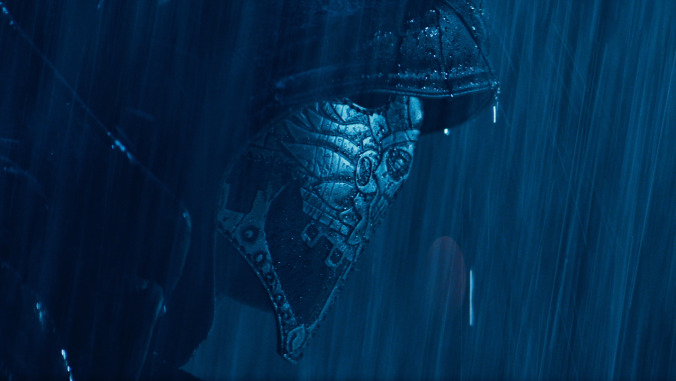“Two clichés make us laugh. A hundred clichés move us. For we sense dimly that the clichés are talking among themselves, and celebrating a reunion.” Umberto Eco wrote that about Casablanca, positing that its synthesis of myriad archetypes, combined with the audience’s ingrained understanding of them, elevated the film to sublimity. It’s tempting to lend the same credence to El Chicano, a new sort-of superhero film that notably sports an all-Latinx cast. The film stars Raúl Castillo as Diego, a police detective who becomes the vigilante figure El Chicano—a.k.a. the “Ghetto Grim Repeater” that stalked the East Los Angeles barrio of his youth—in order to exact vengeance against a drug cartel linked to his brother’s death. It’s rife with clichés from so many different genres (cop movies, comic book origin stories, revenge thrillers) that you wonder if it might achieve that transcendence Eco was talking about. Yet the story never even grazes the sublime; it’s dull and banal, coasting on familiarity from beginning to end. Here, the clichés don’t celebrate a reunion. They’re at war.
While “Mexican American Batman” sounds like a potentially fun idea on paper, it required a much tighter execution to be anything more than derivative. Director Ben Hernandez Bray made his bones in stunt work, which usually indicates an intuitive ability to properly choreograph and film one-on-one fight scenes. In El Chicano, however, they’re muddled and haphazard, shot in a frenzied, Greengrassian style to mask obvious imperfections and artificially heighten the “realism.” Worse, they’re too few and far between, bookended by endless scenes of exposition that over-explain a plot the film can’t or won’t illustrate visually.
Juan Miguel Azpiroz’s muddy cinematography doesn’t help matters at all: Most of El Chicano is set at night, which is a problem because these scenes are either frustratingly dim or imperceptibly dark. The forced hardboiled dialogue, courtesy of Bray and co-screenwriter Joe Carnahan (The Grey, Smokin’ Aces), sounds even more hackneyed when delivered by El Chicano’s overacting ensemble cast. (The film’s elder statesmen—George Lopez, Marco Rodriguez, Marlene Forte—walk away clean.) The slapdash editing renders a mythology-dense film all the more incoherent; many scenes only tenuously connect with each other—evidence that El Chicano was cut down from a much longer runtime after its festival premiere. The most grievous sin might be that the title character doesn’t make his real entrance until about an hour in. Before then, he’s conveniently forgotten for prolonged stretches of time.
Bray, who himself grew up in northwest Los Angeles, was initially inspired to write El Chicano following the gang-related death of his brother. He later finished it after his daughter died at birth. The personal stakes come through in minor but effective ways: tender childhood flashbacks that function as eulogy, regional pride sensitive to all walks of life, and a working knowledge of Mexican American history. It’s easy to see why Bray would be inspired to turn his personal pain into a populist work, especially one that exercises many of his pet interests. (El Chicano features compelling ideas about the intersection between Mexican nationalism and Los Angeles culture, though they are largely undeveloped.)
Yet the movie still feels anonymous, a hodgepodge of influences. It half-commits to being a detective film that examines lingering childhood trauma before half-committing to the superhero mechanics that dominate the third act. By the end, there’s no sense of who “El Chicano” even is beyond his mask and the cool knife he wields. Then again, El Chicano goes through the motions with all of its characterizations: of Diego, of the cartel he investigates, of the world where he resides. Maybe the lone impressive element is its choice to leave all the Spanish dialogue untranslated—a signal of authenticity to those in and outside the Latinx community. Such bona fides obviously extend to the cast and setting (despite the fact that the film was mostly shot in Calgary), yet no such confidence informs the rest of El Chicano. Every community deserves its own Batman, but that doesn’t mean they should settle for this.

 Keep scrolling for more great stories.
Keep scrolling for more great stories.
